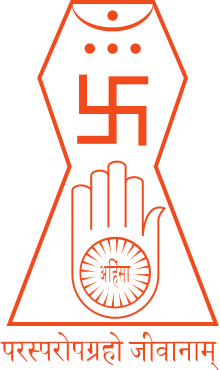Haribhadra
| Haribhadra | |
|---|---|
| Religion | Jainism |
| Sect | Svetambara |
| Personal | |
| Born | 459 CE |
| Died | 529 CE |
| Part of a series on |
| Jainism |
|---|
 |
|
Jain prayers |
|
Ethics |
|
Major figures |
|
Major sects |
|
Festivals |
|
Pilgrimages |
|
|
Haribhadra Suri was a Svetambara mendicant Jain leader and author. There are multiple contradictory dates assigned to his birth. According to tradition, he lived c. 459–529 CE. However, in 1919, a Jain monk named Jinavijayi pointed out that given his familiarity with Dharmakirti, a more likely choice would be sometime after 650.[1] In his writings, Haribhadra identifies himself as a student of Jinabhadra and Jinadatta of the Vidyadhara Kula. There are several, somewhat contradictory, accounts of his life.
Life story
The earlier stories of life of Haribhadra, which dates to the 12th century, says that he was an educated Brahmin who made the boast that he would become a pupil of anyone who stated a sentence which he could not understand. After hearing a Jain nun named Yākinī Mahattarā recite a verse that he could not understand, he was sent to her teacher Jinabhaṭa, who promised Haribhadra that he would instruct him if Haribhadra accepted initiation into Jainism. Haribhadra agreed, and took the name Yākinīputra (Spiritual Son of Yākinī).[2]
The second account, which bears similarities to the story of Akalanka Digambara, also shows the state of relations between Buddhist and Jain mendicants at the time. In this story, Haribhadra was teaching two of his nephews. These nephews went to secretly study logic at a Buddhist temple, and fled after being discovered there. One of them was killed by the Buddhists, and the other died of grief later. Haribhadra engaged the monks of this monastery in a philosophical debate, and emerged victorious. He then ordered the losing monks to jump into a vat of hot oil. When Haribhadra's own teacher heard of this, he ordered Haribhadra to undertake severe penances for his unseemly display of anger and attachment. Haribhadra did so, and took the title "Virahānka", which means "having separation (or viraha, from his nephews) as a distinguishing characteristic".
Tradition ascribes some 1440 different works to him. A more creditable number is in the vicinity of 100, some of which are among the most highly regarded works in Jainism. Scholar H.R. Kapadia attributes eighty-seven works to Haribhadra, Jinavijaya attributes twenty-six and Sukh lal Sanghvi attributes forty-seven.[3] Some have even suggested that, based on the language and subject material of the books ascribed to Haribhadra, there were two Haribhadras, the first of which, Haribhadra Virahānka, may have lived around the sixth century, and the second, Haribhadra Yākinīputra, was a monk who lived in a temple around the eighth century. Scholars of the Svetambara community itself tend to hold with the belief that there was only one Haribhadra. Among his important teachings were tolerance for other traditions, and that ultimate reality can be grasped from multiple different perspectives.
Philosophy and Influence
With his writings, he established that Sanskrit, rather than Prakrit, would be the language of Jain study. He used his only familiarity with the techniques of brahminical study and wrote in the same style. He is also noted for the great respect he displays toward other religious traditions. He even did what few other Jain scholars have done, and wrote a commentary on the Nyāyapraveśa, a text by Śaṅkarasvāmin on the form of Indian logic formulated by the Buddhist scholar Dignāga.[4] He does however ultimately support Jain thought, arguing that the other beliefs tend to display only a one-sided view of the greater reality.[5] He tried to combine the good points of various religious philosophies that existed in his times for spiritual liberation in his work yogadrstiamuccaya.[6]
Works
Among his other works are:
- Anekāntajayapatākā (The Victory Banner of Relativism) - which puts forward arguments about anekantavada
- Ashtakaprakarana (The Eightfold Explanation)
- Dharmabindu - which outlines the duties of the laity, outlines rules for mendicants, and describes the bliss of moksha
- Dhūrtākhyāna (The Rogue's Stories) - a satire of Hinduism
- Pañcāśaka - a Prakrit work on rituals and spiritual matters
- Ṣaḍdarśanasamuccaya (Compendium of Six Philosophies) - which compares Jainism with other schools of Indian philosophy
- Samarāiccakahā (The Story of Samarāicca) - a narrative which outlines the effects of karma in a story about the enmity of its characters which endures over several reincarnations
- Sāstravārtāsamuccaya (The Array of Explanatory Teachings)
- Yogabindu (The Seeds of Yoga) - a work on yoga
- Yogadrishtisamuccaya (An Array of Views on Yoga) - another work on yoga
- Yogaśataka - a third work on yoga. In these three volumes, he compares the yoga of Jainism with the other varieties of yoga prevalent in India at the time.
- Sanmatti Prakaran
Notes
- ↑ Chapple 2003, pp. 1–2
- ↑ Dundas 2002, p. 12
- ↑ Chapple 2003, p. 5
- ↑ Tachikawa 1970
- ↑ Chapple 2003, p. 8
- ↑ Chapple 2003, p. 1
References
- Chapple, Christopher Key (2003), Reconciling Yogas: Haribhadra's Collection of Views on Yoga, Suny Press, ISBN 978-0-7914-5899-0
- Dundas, Paul (2002), The Jains, Routledge, ISBN 978-0-415-26605-5
- Great Thinkers of the Eastern World (1995), I.P.McGreal (ed.), Harper Collins, New York.
- Wiley, Kristi L. Historical Dictionary of Jainism. Lanham, MD:The Scarecrow Press, Ltd. 2004. ISBN 0-8108-5051-6.
- Glasenapp, Helmuth Von (1999), Jainism: An Indian Religion of Salvation, Delhi: Motilal Banarsidass, ISBN 81-208-1376-6
- Tachikawa, Musashi. "A Sixth-Century Manual of Indian Logic (A Translation of the Nyayapravesa)." Journal of Indian Philosophy 1 (1970/2), 111-145.